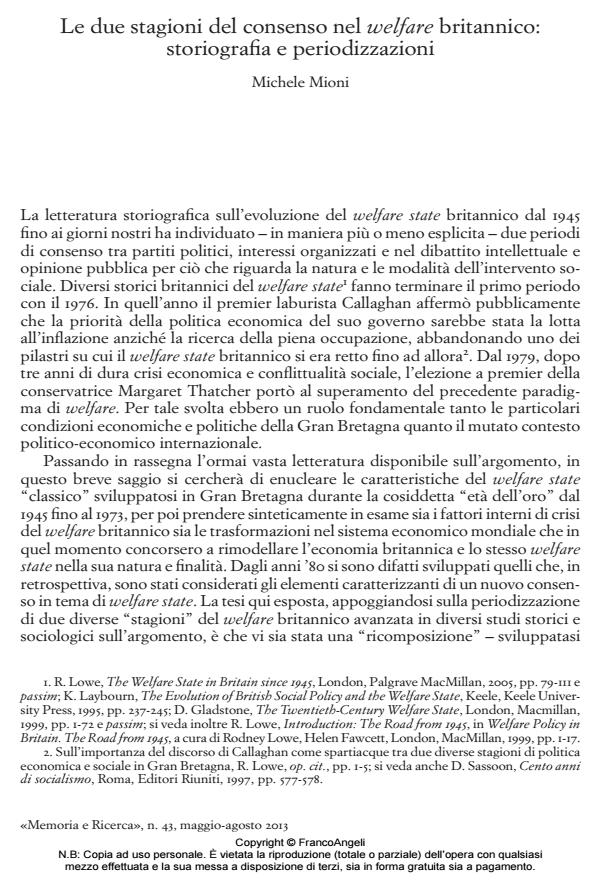Le due stagioni del consenso nel welfare britannico: storiografia e periodizzazioni
Titolo Rivista MEMORIA E RICERCA
Autori/Curatori Michele Mioni
Anno di pubblicazione 2013 Fascicolo 2013/43
Lingua Italiano Numero pagine 18 P. 167-184 Dimensione file 144 KB
DOI 10.3280/MER2013-043011
Il DOI è il codice a barre della proprietà intellettuale: per saperne di più
clicca qui
Qui sotto puoi vedere in anteprima la prima pagina di questo articolo.
Se questo articolo ti interessa, lo puoi acquistare (e scaricare in formato pdf) seguendo le facili indicazioni per acquistare il download credit. Acquista Download Credits per scaricare questo Articolo in formato PDF

FrancoAngeli è membro della Publishers International Linking Association, Inc (PILA)associazione indipendente e non profit per facilitare (attraverso i servizi tecnologici implementati da CrossRef.org) l’accesso degli studiosi ai contenuti digitali nelle pubblicazioni professionali e scientifiche
The scientific literature focused on the british welfare state agrees with the periodization of two great periods of consensus in the post-war Britain about the social policies. The first period had coincided with the so called "golden age" in Western Europe, approximately from 1945 to 1973. This welfare state had been inspired by the principles of the Beveridge Plan and by the keynesian economic policy. The consensus concerned both the welfare state and the economic policies, and it had been characterised by an universalistic social security system, the free national health service and a set of policies to encourage the full employment. This model fell into a crisis during the decade from 1970 to 1980, when the economical pillars whereupon the "classic" welfare state were built collapsed one by one. At the same time, the rise of neoliberals theories has challenged in the dominant political discourses the previous keynesian orthodoxy in the matter of economic policy in Britain. The same continuity of certain aspects of social policy from Thatcher’s to New Labour’s governments allowed us to identify a new consensus toward welfare policies. The reforms implemented by governments ensued from 1979 have been characterised by the structural reform of the social security system and by a sort of "return" to the residual, individual and private sector-oriented ways of social intervention, which in some sense had characterised also the social policies in Great Britain before 1945.
Parole chiave:Welfare state, historiography, periodization, labourism, neoliberalism, Beveridge Plan Giancarlo Monina
Michele Mioni, Le due stagioni del consenso nel welfare britannico: storiografia e periodizzazioni in "MEMORIA E RICERCA " 43/2013, pp 167-184, DOI: 10.3280/MER2013-043011